Garden Maintenance in Poplar
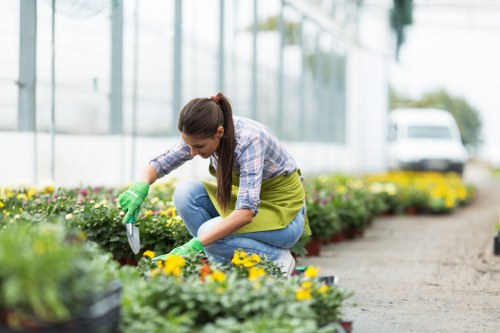
Why Garden Maintenance is Essential in Poplar
Maintaining a garden in Poplar is more than just a hobby; it’s a commitment to enhancing the beauty and value of your property. Proper garden maintenance ensures that your outdoor space remains vibrant and healthy throughout the year. The local climate and soil conditions in Poplar present unique challenges that require specific care routines.
Regular upkeep helps in preventing common issues such as pest infestations, disease outbreaks, and weed overgrowth. By staying proactive, gardeners can enjoy a lush, thriving garden that serves as a personal sanctuary and a welcoming space for visitors.
Moreover, a well-maintained garden contributes to environmental benefits, including improved air quality, increased biodiversity, and better water management. Investing time and effort into garden care not only beautifies your surroundings but also supports the local ecosystem.
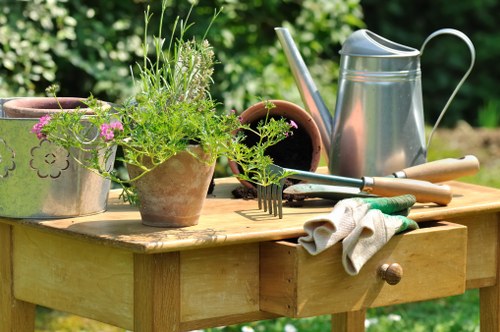
Seasonal Garden Care in Poplar
Spring Maintenance
Spring is a critical time for garden maintenance in Poplar. As the weather warms up, it’s essential to prepare your garden for the growing season. Start by clearing out any debris left over from winter, such as fallen leaves and dead plants. This cleanup helps prevent pests from taking hold and prepares the soil for new growth.
Now is also the perfect time to assess your garden’s layout. Consider pruning trees and shrubs to encourage healthy growth and enhance the overall structure of your garden. Planting new flowers and vegetables in the spring can provide a colorful and productive garden throughout the season.
Additionally, applying a fresh layer of mulch can help retain moisture in the soil, suppress weeds, and provide essential nutrients to your plants. Spring is the foundation for a successful gardening year, so dedicating time to these tasks is crucial.
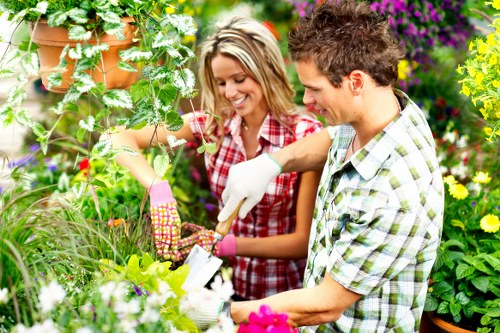
Summer Maintenance
During the summer months, maintaining your garden requires consistent attention to watering and weeding. Poplar’s warm climate can lead to rapid growth, so regular watering ensures that your plants remain healthy and vibrant. It’s best to water early in the morning or late in the evening to minimize evaporation and maximize absorption.
Weeding is another critical task in the summer, as weeds compete with your plants for nutrients and water. Regularly removing weeds helps your garden thrive and maintains its aesthetic appeal. Additionally, consider installing an irrigation system to streamline the watering process and ensure even distribution of water.
Pest control becomes increasingly important in the summer. Keep an eye out for common garden pests and take proactive measures to manage them. Utilizing natural pest deterrents and organic treatments can protect your plants without harming beneficial insects.
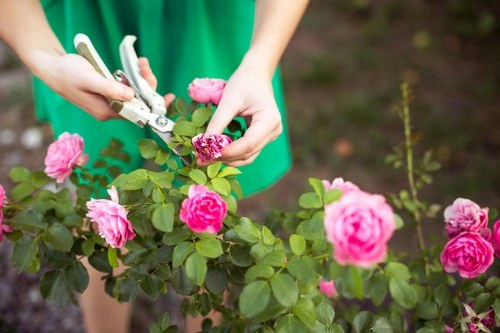
Autumn Maintenance
Autumn in Poplar is the time to prepare your garden for the cooler months ahead. Begin by harvesting any remaining vegetables and cutting back overgrown plants. This helps prevent diseases and pests from overwintering in your garden.
Leaf litter should be cleared regularly to avoid suffocating your plants and inhibiting their growth. Composting fallen leaves can provide valuable nutrients to your garden, enhancing soil fertility for the next planting season.
It’s also advisable to plant bulbs in the autumn that will bloom in the spring. This simple task can add bursts of color to your garden as the weather warms. Additionally, consider mulching your garden beds to protect the roots of perennials and shrubs from frost.
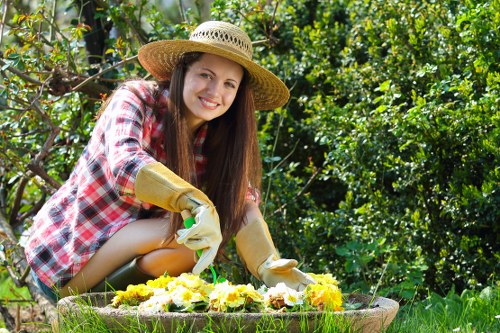
Winter Maintenance
Winter might seem like a dormant period for your garden, but proper maintenance during these months can set the stage for a successful spring. Inspect your garden for any signs of damage caused by harsh weather and take steps to repair them. This includes covering delicate plants and securing structures like trellises and fences.
Protecting your plants from frost is essential. Use frost blankets or burlap to shield sensitive species from extreme cold. Additionally, continue to monitor moisture levels in the soil to prevent it from becoming too dry or waterlogged.
Planning is another aspect of winter maintenance. Use this time to design new garden layouts, select plants for the upcoming season, and order necessary supplies. A well-thought-out plan ensures that your garden flourishes when warmer days return.

Choosing the Right Plants for Poplar Gardens
Selecting appropriate plants is fundamental to successful garden maintenance in Poplar. Opt for species that are well-suited to the local climate, soil conditions, and sunlight availability. Native plants often thrive with minimal care and contribute to the local ecosystem by attracting pollinators and providing habitat for wildlife.
Consider a mix of perennials and annuals to ensure year-round interest in your garden. Perennials offer lasting beauty and resilience, while annuals can be changed each season to reflect new trends and preferences. Incorporating a variety of textures, colors, and heights can add depth and dimension to your garden design.
Additionally, think about the maintenance requirements of each plant. Some may need more frequent pruning, watering, or pest control, so choose plants that match your gardening expertise and availability. Balancing low-maintenance options with plants that require more care can create a manageable yet stunning garden.

Soil Health and Fertilization
Testing and Improving Soil Quality
Healthy soil is the backbone of any thriving garden. Conducting a soil test in Poplar can help you understand the pH levels, nutrient content, and composition of your garden soil. This information is crucial for selecting the right amendments and fertilizers to enhance soil fertility.
Amending your soil with organic matter such as compost, manure, or peat moss can improve its structure, drainage, and nutrient-holding capacity. Organic materials also promote beneficial microbial activity, which supports plant health and growth.
Regularly aerating your soil helps prevent compaction, allowing roots to penetrate deeply and access essential nutrients and water. Mulching also plays a vital role in maintaining soil health by retaining moisture, regulating temperature, and suppressing weeds.

Fertilization Strategies
Proper fertilization is key to sustaining healthy plants in your Poplar garden. Choose fertilizers based on the specific needs of your plants and the results of your soil test. Organic fertilizers, such as bone meal or fish emulsion, provide slow-release nutrients that support long-term plant health.
Chemical fertilizers can offer immediate nutrient delivery, but they should be used sparingly to avoid soil degradation and environmental harm. Follow the recommended application rates and timing to prevent over-fertilization, which can lead to nutrient burn and plant stress.
Implementing a regular fertilization schedule, tailored to the growth cycles of your plants, ensures that they receive the necessary nutrients throughout the year. This proactive approach fosters robust growth and enhances the overall vitality of your garden.

Pest and Weed Control
Integrated Pest Management (IPM)
Effective pest control is an integral part of garden maintenance in Poplar. Adopting an Integrated Pest Management (IPM) approach helps manage pests sustainably by combining biological, cultural, physical, and chemical methods. This minimizes the reliance on harmful pesticides and promotes a balanced ecosystem.
Start by monitoring your garden regularly to identify pest issues early. Encourage beneficial insects, such as ladybugs and lacewings, which prey on common garden pests. Introducing companion planting can also deter unwanted insects and promote plant health.
If pest populations become problematic, use targeted treatments like neem oil or insecticidal soaps. These options are less toxic to beneficial organisms and the environment. Avoiding broad-spectrum pesticides helps maintain the natural balance in your garden and reduces the risk of pest resistance.

Weed Management Techniques
Weeds compete with your garden plants for light, water, and nutrients, making effective weed control essential. Manual removal is one of the most straightforward methods for managing weeds, especially in smaller gardens. Ensure you remove the entire root system to prevent regrowth.
Mulching is an excellent preventative measure against weed growth. A thick layer of mulch around your plants inhibits weed seed germination and reduces the need for constant weeding. Organic mulches, like straw or wood chips, also enrich the soil as they decompose.
Cultural practices, such as proper spacing and selecting dense planting varieties, can naturally suppress weed growth by limiting the available space for weeds to establish. Combining these techniques creates a multi-faceted approach to weed management, ensuring a healthier and more attractive garden.

Lawn Care Tips for Poplar Gardens
Maintaining a Healthy Lawn
A lush, green lawn is often the centerpiece of a Poplar garden. Achieving and maintaining this requires regular care, including mowing, watering, and fertilizing. Mow your lawn to the recommended height for your grass type, ensuring that you never remove more than one-third of the grass blade at a time.
Proper watering is critical, especially during the hot summer months. Deep, infrequent watering encourages deep root growth and enhances drought resistance. Early morning is the best time to water your lawn, minimizing evaporation and fungal growth.
Fertilizing your lawn with the right nutrients supports strong growth and resilience against pests and diseases. Choose a fertilizer that matches your soil’s nutrient profile and follow the application guidelines to avoid over-fertilization, which can lead to nutrient runoff and environmental issues.

Dealing with Common Lawn Problems
Poplar lawns can face various challenges, including brown patches, weeds, and insect damage. Identifying the underlying causes of these issues is essential for effective treatment. Brown patches might indicate overwatering, underwatering, or fungal diseases. Adjust your watering schedule and improve drainage to address these problems.
Weeds are a constant battle in lawn maintenance. Regular mowing and proper fertilization can help keep weed populations in check. For persistent weeds, consider using selective herbicides that target specific weed species without harming your grass.
Pest control is also a vital aspect of lawn care. Insects like grubs and chinch bugs can cause significant damage to your turf. Implementing preventive measures, such as aerating your lawn and maintaining proper soil moisture, can reduce the likelihood of infestations. If pests are detected, use appropriate treatments to protect your lawn’s health.

Hardscaping and Garden Design
Incorporating Hardscape Elements
Hardscaping refers to the non-living components of your garden, such as pathways, patios, and retaining walls. Incorporating these elements can enhance the functionality and visual appeal of your Poplar garden. Well-designed hardscape features provide structure and serve as focal points, guiding the flow of movement and creating distinct areas for different activities.
When planning hardscaping, consider the materials that complement your garden’s natural elements. Stone, brick, and wood are popular choices that offer durability and aesthetic appeal. Thoughtful placement of hardscape elements can highlight your garden’s best features and provide practical benefits like seating areas and defined walkways.
Integrating hardscaping with your softscape, the living parts of your garden, creates a harmonious balance. Strategic design ensures that both elements work together, enhancing the overall coherence and beauty of your outdoor space.

Design Principles for an Attractive Garden
Effective garden design involves understanding and applying key principles such as balance, contrast, and unity. Balance ensures that your garden feels stable and pleasing to the eye, while contrast adds visual interest through varying colors, textures, and shapes.
Unity creates a sense of cohesion, making all the elements of your garden work together harmoniously. This can be achieved by maintaining a consistent theme, color palette, or style throughout your garden. Incorporating focal points, such as a feature plant or a water feature, can draw attention and create a central area of interest.
In addition to aesthetics, functionality is crucial in garden design. Ensure that there is adequate space for movement, and that the layout supports the activities you enjoy, whether it’s entertaining, gardening, or simply relaxing outdoors.

Tools and Equipment for Effective Garden Maintenance
Essential Gardening Tools
Having the right tools is essential for efficient and effective garden maintenance in Poplar. Basic tools include a sturdy hand trowel, pruning shears, a garden fork, a hoe, and a reliable lawnmower. These tools enable you to perform a variety of tasks, from planting and weeding to cutting and trimming.
Investing in quality tools can make a significant difference in your gardening experience. Durable, well-designed tools not only last longer but also reduce the physical strain associated with garden tasks. Ergonomic designs can help prevent injuries and improve your overall efficiency.
In addition to hand tools, consider incorporating power tools such as a leaf blower, string trimmer, and hedge cutter for larger gardens. These tools save time and effort, making it easier to maintain expansive outdoor spaces.

Maintenance of Tools and Equipment
Proper care of your gardening tools ensures their longevity and optimal performance. Regular cleaning removes dirt, sap, and debris that can cause rust and wear. Sharpen blades and replace worn parts as needed to maintain their effectiveness.
Storage is also critical in preserving your tools. Keep them in a dry, sheltered area to protect them from the elements. Using tool racks or sheds helps organize your equipment, making it easier to access and reducing the risk of damage.
Periodic maintenance checks can identify potential issues before they become major problems. Taking the time to maintain your tools not only extends their lifespan but also enhances your overall gardening efficiency and enjoyment.

Hiring Professional Garden Maintenance Services in Poplar
Benefits of Professional Services
While DIY garden maintenance can be fulfilling, hiring professional services in Poplar offers several advantages. Professional gardeners bring expertise and experience, ensuring that your garden receives high-quality care tailored to its specific needs. They can identify and address issues quickly, preventing minor problems from escalating into major setbacks.
Moreover, professionals have access to specialized tools and resources that may not be available to the average homeowner. This allows for more efficient and effective maintenance, saving you time and effort. They can also provide valuable advice on plant selection, garden design, and sustainable practices that enhance your garden’s health and beauty.
Engaging professional services can also alleviate the physical demands of garden maintenance, making it easier to maintain your outdoor space without compromising your well-being. This is especially beneficial for larger gardens or for individuals with limited time or mobility.

Choosing the Right Garden Maintenance Service
Selecting the right professional service involves assessing their qualifications, experience, and reputation. Look for licensed and insured gardeners who have a proven track record in garden maintenance in Poplar. Reading reviews and seeking recommendations can provide insights into their reliability and quality of work.
Consider the range of services they offer and ensure they align with your garden’s specific needs. Some professionals may specialize in certain areas, such as organic gardening, landscape design, or lawn care. Choosing a service that matches your requirements ensures comprehensive and effective maintenance.
Additionally, transparent pricing and clear communication are essential factors in selecting a garden maintenance service. Request detailed quotes and discuss your expectations to ensure there are no misunderstandings. A reputable service will be willing to tailor their offerings to meet your garden’s unique needs.

DIY vs. Professional Garden Maintenance
Pros and Cons of DIY Maintenance
Taking on garden maintenance yourself can be rewarding and cost-effective. DIY gardening allows you to develop a personal connection with your outdoor space and customize your care routines to suit your preferences. It also provides flexibility in managing your garden schedule and experimenting with different plants and techniques.
However, DIY maintenance requires a significant time investment and a certain level of expertise. Without proper knowledge, you might struggle to address complex issues such as pest infestations or soil deficiencies. Additionally, the physical labor involved can be demanding, especially for larger gardens.
Balancing the benefits and challenges of DIY gardening is essential. For smaller gardens or for gardeners with ample time and knowledge, DIY maintenance can be highly effective. However, for more extensive or complicated gardens, seeking professional assistance might be the more practical and efficient option.

When to Hire Professionals
Determining when to hire professional garden maintenance services depends on various factors, including the size of your garden, the complexity of maintenance tasks, and your personal availability. If your garden requires specialized care, such as landscape design or advanced pest management, professionals can provide the necessary expertise.
Hiring professionals can also be beneficial during peak seasons when the demand for garden services is high, and your schedule might be too busy to manage everything yourself. Additionally, if you encounter persistent issues that you’re unable to resolve through DIY methods, seeking professional help can prevent further damage and ensure your garden’s health.
Ultimately, deciding between DIY and professional maintenance involves evaluating your garden’s needs and your capacity to meet them. A combination of both approaches can also be effective, allowing you to handle tasks you’re comfortable with while delegating more complex maintenance to experts.

Sustainable Gardening Practices
Eco-Friendly Maintenance Techniques
Adopting sustainable gardening practices in Poplar not only benefits your garden but also supports the environment. Eco-friendly maintenance techniques focus on minimizing resource use, reducing waste, and promoting biodiversity. Implementing these practices can lead to a healthier, more resilient garden ecosystem.
One key aspect of sustainable gardening is water conservation. Using rain barrels to collect and store rainwater for irrigation reduces dependency on municipal water sources. Additionally, employing drip irrigation systems ensures precise water delivery, minimizing waste and promoting efficient plant growth.
Organic gardening is another sustainable approach that emphasizes the use of natural fertilizers and pest control methods. Avoiding synthetic chemicals preserves soil health and protects beneficial insects, creating a balanced and self-sustaining garden environment.

Composting and Waste Reduction
Composting is an essential practice for sustainable garden maintenance. By recycling organic waste such as kitchen scraps, leaves, and grass clippings, you create nutrient-rich compost that enhances soil fertility and structure. Composting reduces the amount of waste sent to landfills and lowers the need for chemical fertilizers.
Implementing waste reduction strategies, such as using reusable mulch materials and repurposing garden waste, contributes to a more sustainable maintenance routine. Additionally, choosing biodegradable garden products and minimizing plastic use further support environmental stewardship.
Encouraging wildlife in your garden, such as birds and beneficial insects, promotes natural pest control and enhances biodiversity. Creating habitats with native plants, water features, and shelter areas ensures a thriving and balanced garden ecosystem.

Energy-Efficient Practices
Incorporating energy-efficient practices into your garden maintenance can reduce your environmental footprint and lower operational costs. Using solar-powered garden lights, for example, provides illumination without increasing your electricity usage. Similarly, selecting energy-efficient tools and equipment minimizes fuel consumption and emissions.
Implementing effective garden design can also contribute to energy efficiency. Strategically placing plants to provide natural shade and windbreaks can regulate outdoor temperatures, reducing the need for artificial heating or cooling. This thoughtful planning enhances both the comfort and sustainability of your garden space.
Moreover, maintaining your garden tools and equipment ensures they operate efficiently, conserving energy and extending their lifespan. Regular maintenance prevents unnecessary energy consumption and supports a more sustainable gardening approach.

Conclusion
Enhancing Your Poplar Garden
Effective garden maintenance in Poplar requires a combination of knowledge, dedication, and the right resources. By following seasonal care routines, selecting appropriate plants, maintaining soil health, and managing pests and weeds, you can cultivate a beautiful and thriving garden.
Incorporating sustainable practices and deciding between DIY and professional services further enhances the health and longevity of your garden. Whether you’re a seasoned gardener or just starting, investing time and effort into garden maintenance pays off in the form of a vibrant, inviting outdoor space.
Ready to transform your garden into a stunning oasis? Contact us today or book your service now to ensure your Poplar garden remains a beautiful and healthy haven all year round.